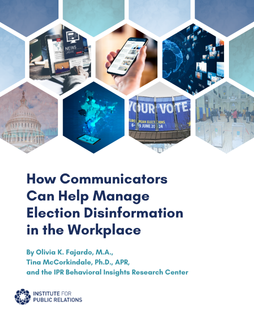Does the profession of public relations contribute more than $200 billion in economic impact worldwide, and does that matter? Toni Muzi Falconi thinks it does.
He also thinks that there some 3 million public relators operating in the world today, but less than 10% are members of professional associations.
Falconi – who teaches at Lumsa University in Rome as well as New York University, founded a highly successful PR agency in the late 1970s that Weber Shandwick acquired in 1999, and serves on the Institute for Public Relations’ Commission on International PR – recently published a paper on our website. There Toni argues that our identity as a profession (not just a service industry or a staff function) has a strong connection to size and economic impact on society at large.
“Being big does not make public relations a profession,” says Toni. “But evaluating ourselves and being measured in the same way as other professions may be a critical step toward being seen in the same light. To do that, we must think outside the budget. And we must realize that ours is a labour intensive activity, and that we should no longer passively accept that our economic impact be measured by adopting the same capital intensive criteria that the advertising sector uses.
“In doing so, we may be better positioned to differentiate what we do from marketing and advertising, and perhaps even to seize the attention of government, institutional and corporate policy makers in a way that goes far beyond the level of notice we have achieved in the past. Thus, it behooves the global professional community to discuss and concur on new and agreed upon criteria of evaluation.”
Please take a look at Toni’s new paper and join the conversation.
Frank Ovaitt
President and CEO
Institute for Public Relations




As is probably well known by my courteous interlocutors, over the last ten years many more consolidated and traditional liberal professions (legal, medical, accounting…) have had a hell of a time in keeping up with the constant profile changes of what they do and struggle in finding an acceptable definition. The implication is that strictly defining the boundaries of any profession today is practically impossible and likely to be entirely useless.
If one agrees on this, then perhaps we as public relators may also agree that the naming game has become inane, thanks to the growing complexity of society which has also brought other professions nearer to our permanent state of ambiguity.
The next step, however, is to argue convincingly that we are a labour rather than a capital intensive profession and that the economic impact we have on society needs to be analysed as such. This is one way also to begin a serious analysis of our impact on the public interest, which is the basis for any debate on regulationself or otherwise.
And these two concepts (which I argue in my paper) call for a widespread dialogue to cut away from our old and fading sense of belonging to the advertising family, which has been beneficial for many but at the same time has created difficulties in the formation of a specific identity, within ourselves…. even before amongst others.
In any case, the quicker we move out of the definition argument the better it is.
Don Radoli indicates many wise moves as necessary…but only we can do it, nobody else. Maybe, some of the arguments of the paper could be useful in this direction.
Falconi’s paper raises important issues about the legitimacy of the PR profession and its impact and place in society. His proposal for recognition, however, falls short of what is imperative to raise the status of the profession. Numbers alone don’t cut it, otherwise teachers and lecturers whose impact and value to society is undoubtedly greater than that of PR hacks would command higher pay. They don’t.
The bane of the PR profession goes back to the original practictioner of Press agentry—P.T. Barnum in the 1830s. Through his antics, he did untold damage to the profession. In some circles PR and PR practitioner are pejorative terms. This ignominious heritage has led to a situation where practically anybody can set up shop as a PR consultant.
To gain respect and legitimacy, the PR profession has to close the practice to unqualified seat of the pants practitioners. It has to lobby for legislation that requires practitioners to be qualified and licenced. The unqualified should be prohibited from practicing. Lawyers, doctors, architects and accountants have done it. Why can’t we?
What would be the consequence of this? Firstly we would be able to define our profession and fight for its relevance in society instead of being an appendage to marketing or advertising. Secondly, the profession would be able define its contribution to society by stressing the economic value of stakeholder relationship building. The economic and opportunity cost of conflict could also be systematically analysed and quantified in economic terms. In the global scramble for “definition hegemony” you can bet no other profession or discipline will come to the aid of the PR profession. It has to define itself or be defined by others.
Mr. Falconi makes strong and cogent arguments for re-evaluating how public relations is measured and reported, but I am not sure that the chosen metrics will hold up to scrutiny until there is a global consensus on the definition of public relations and what constitutes public relations. Without a clear set of definitions, it will be nearly impossible to get buy-in on this strategy. I think his argument that we need to continue to create a strong distinction of our work and not loop it in under the umbrella of advertising and marketing, is our best shot at ensuring credibility for our work. I teach public relations at Northern Arizona University in Flagstaff and my students struggle with the definitions because our work is not discreet, it bleeds into every aspect and business function. Before returning to academia for my PhD, I worked in the private sector for 15 years in public relations. My work spanned two continents in internal communication, financial communication, crisis communication, community building, industry issues, environmental issues, governmental affairs, and strategic planning. All of this work came under the rubric of public relations!